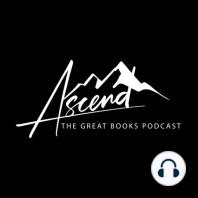90 min listen

Iliad: Book 15 | The Achaean Armies at Bay
Iliad: Book 15 | The Achaean Armies at Bay
ratings:
Length:
52 minutes
Released:
Apr 9, 2024
Format:
Podcast episode
Description
Deacon Harrison Garlick welcomes Dr. Jessica Hooten Wilson to the podcast to discuss Book 15 of The Iliad, The Achaean Armies at Bay.In this episode we will discuss:What happens in book fifteen?What is the relationship between men and the will of the gods in book fifteen? What else should be noted in book fifteen?You can follow Dr. Jessica Hooten Wilson on X at @HootenWilsonWant our whole guide to The Iliad? Download it for free.67. What happens in book fifteen?Zeus, the father of gods and men, awakes to find the Trojans in full retreat (15.05). Poseidon is leading the Achaean charge, and Hector lays sprawled upon the ground (15.10). Zeus immediately blames Hera (15.18), and Hera denies any involvement with Poseidon’s actions (15.45). Zeus explains to Hera his plan in detail: Patroclus will fight, Hector will kill him, and Achilles will then kill Hector (15.80). The Achaeans will then push the assault until Troy falls (15.88). And Sarpedon—Zeus’ own son—will be sacrificed to bring about this fate (15.84). Zeus, via Hera, sends Iris to tell Poseidon to “quit the war and slaughter” and return to the sea (14.210). Poseidon eventually obeys (15.251). Zeus, via Hera, sends Apollo to rally the Trojans and gives Apollo his storm-shield (15.272). Apollo heals Hector and the two lead a Trojan assault against the Argives (15.302). The Achaeans panic (15.385) and “clambered back in a tangled mess” (15.405). Meanwhile, Patroclus was still tending to the wounded Eurypylus when the new Trojan assault spurs him to return to Achilles (15.470). Giant Ajax forms a phalanx, a “wall of bronze,” to stop Hector from burning the Achaean ships (15.657). The defense fails, yet Giant Ajax carries on jumping from ship to ship with an “enormous polished pike for fights at sea” (15.787). Hector calls for fire to burn the ships (15.832), and the book ends with Ajax fighting off the hordes—having “impaled” twelve Trojans thus far (15.866). 68. What is the relation between men and the will of the gods in book fifteen?A predominant theme in Homer and a perennial question throughout many of the great books is the relationship between the human will and the divine. In book fifteen, Thoas, an Achaean, is able to discern Zeus is favoring Hector; thus, he counsels Giant Ajax to call a “withdraw to the ships” (15.349). We receive yet another example of interpreting what should be done by reading the will of the gods in earthly affairs. Homer provides us a unique example of interpreting the divine will when Zeus lets loose a crack of thunder in response to Nestor’s prayer—but the Trojans interpret it in favor of them (15.445). In fact, Hector tells us it is “easy to see what help Zeus lends to mortals” (15.570). Homer invites us to consider what irony Hector’s statement bears by revealing later that as Zeus glorifies Hector, Athena is already preparing his death (15.712). On the matter of burning the Achaean ships, Hector himself acknowledges that at times Zeus “blinds” men to a certain purpose and then later “drives” them to it (15.840). How men are supposed to know what the gods will for them—amongst such capricious gods or gods that disagree with each other—is a question raised by Homer and later taken up by Plato. 69. What else should we observe in book fifteen?The story of Zeus stringing up Hera with two anvils hanging from her legs (15.24) is the same story referenced in the first book in which Zeus throws Hephaestus—who had...
Released:
Apr 9, 2024
Format:
Podcast episode
Titles in the series (22)
How to Read the Great Books Well by Ascend - The Great Books Podcast